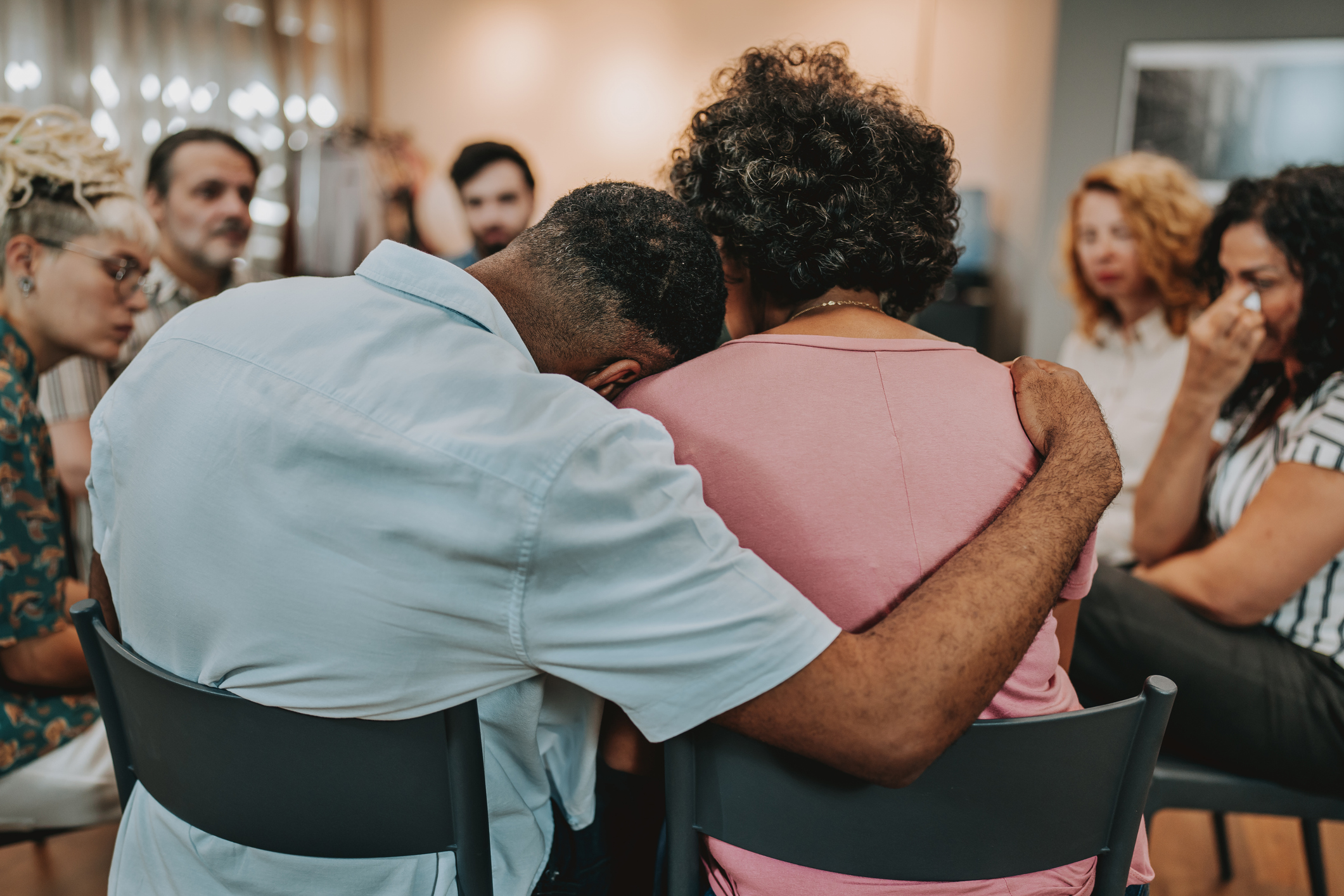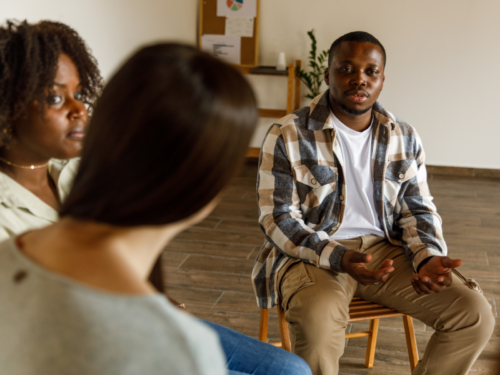
Table of Contents
How to Help Someone With PTSD

Written By: Ashley Laderer

Clinically Reviewed By: Meghan Jensen
October 18, 2024
7 min.
If your loved one struggles with PTSD, you may be wondering how you can best support them. Read on for expert tips on how to help someone with PTSD.
Learn more about our Clinical Review Process
Table of Contents
Living with post-traumatic stress disorder (PTSD) isn’t easy –– and it isn’t always easy knowing how to help someone with PTSD, either. If you have a loved one who is a trauma survivor, you might feel unsure about how you can best support them. It can be difficult to know how to help without overstepping boundaries or being too pushy. When you see someone you love hurting, it’s natural to want to fix the problem ASAP, but it’s important to be patient and empathetic as your loved one moves through the healing process at their own pace.
Read on for our guide on practical ways to support a friend, family member, or partner with post-traumatic stress disorder.

We can help your loved one cope with PTSD
Virtual, intensive therapy for PTSD and other trauma-related conditions.
8 ways to help someone with PTSD
Everyone is different and has different needs while they emotionally heal. However, here are eight general tips that can help you support someone with PTSD.
1. Educate yourself first
To best help someone with post-traumatic stress disorder, it’s important to educate yourself on this mental health condition, says Na’Keora Bryant, MSC, a Charlie Health Group Facilitator.
Without a solid understanding of what PTSD is and the disorder’s symptoms, it’s hard to know what your loved one is dealing with –– especially if you’ve never experienced trauma before. Some examples of key PTSD symptoms include:
- Flashbacks
- Physical symptoms (like sweating or a racing heart) during flashbacks
- Intrusive thoughts or memories about the traumatic experience
- Avoiding any reminders of the trauma
- Depressed mood
- Withdrawing from loved ones
- Inability to feel positive emotions
- Irritability and anger
- Hypervigilance
- Engaging in reckless behavior
- Distressing physical
It’s also important to know that PTSD can be caused by all sorts of traumatic events, not just what is commonly portrayed in the media. “Know that it doesn’t have to feel like a super traumatic trauma to you, but if that person feels as though it’s traumatic, then that’s their experience,” Bryant says. “You just have to understand how to empathize and respond appropriately.”
2. Be a good listener
Many people who struggle with a mental health condition simply want someone to listen, and this is what you can do for your family member, friend, or partner with PTSD. Let your loved one know that you’re here to listen if they ever want to vent or open up about how they’re feeling.
However, it’s important to avoid being pushy. “You don’t have to push them to talk about anything or to push them to heal faster. Just go with their flow,” Bryant says. Listen to what they have to share at their own pace. Here are a few dos and don’ts to be a good listener for someone with PTSD:
- Let them know they can open up at their own pace
- Listen to them without trying to “fix” them
- Ask them how you can help
- Don’t judge them
- Don’t interrupt them when they’re sharing
- Don’t offer unsolicited advice
- Don’t engage in toxic positivity
3. Remember that recovery takes time
Recovering from trauma isn’t easy, and everyone heals at their own pace. Not to mention, recovery isn’t linear, and it’s normal for there to be setbacks along the way, so be patient and understand that recovery takes time, Bryant says. There may be times when symptoms are at bay and other times when symptoms are flaring up, especially if they’re triggered. Remember that everyone copes differently, and your loved one may cope in ways different than how you would – so honor these differences along their mental health healing process.
4. Respect their boundaries
After experiencing a traumatic experience, people may be extra sensitive and hypervigilant, which makes it extra important to respect their boundaries. If your loved one sets any boundaries with you, make sure to respect them.
For example, after experiencing physical or sexual trauma, someone might not want to be touched. So, if your loved one tells you they don’t want to be touched, honor this boundary, even if you really want to hug them, Bryant says. You don’t want to trigger them and set off more symptoms during this vulnerable time.
If they haven’t set any clear boundaries, you can ask them if they want to set any boundaries with you that would be helpful in their healing so you can help them feel as safe as possible.
5. Be encouraging but not forceful
Encouraging
Forceful
Gently suggest engaging activities that could help lift their spirits, like going for a walk or watching a movie together, but respect if they’re not ready.
Insist that they join you in an activity or repeatedly pressure them to socialize, even when they express a need to rest or be alone.
Trauma survivors may want to withdraw and isolate, but this can further worsen their mental health. Bryant suggests being “encouraging, but not forceful.” This means you can try to encourage them to engage in an activity with you, such as going for a walk or watching a movie together, but understand that they won’t always be up for this, especially if they’re experiencing depressive symptoms, and you can’t force them.
Bryant says you can suggest activities that are fun and supportive in a safe environment for them. They may not always want to join, and it’s important to respect that. If they’re not ready, try again another time. Your encouragement, without pressure, shows them that you care and are here for them.
6. Help them find professional help — if they’re ready
You can offer assistance in finding professional help through a therapist, psychiatrist, or support group –– but only if they’re ready. It’s natural to want to step in and get into “fix-it mode,” but healing from trauma and PTSD requires a true willingness to engage in treatment.
“It’s definitely hard to see a loved one be impacted by PTSD, and as much as you want to help them, you cannot help someone who is not willing to be helped or who does not want the help,” Bryant says. “If you’re supporting someone in getting help and it seems more difficult than it should be, then it may be the case that that person’s not ready for the help.”
In this case, you should respect their wishes. You don’t want them to get into defense mode or think that you are part of the problem, potentially damaging your relationship, says Bryant. You can let them know that you’re here to help however they need you, and that professional help is available whenever they’re ready. If your loved one is ready to take the first step towards professional mental health treatment, offer help however you can. This could include:
- Researching different PTSD treatment options (cognitive behavioral therapy (CBT) and prolonged exposure therapy (PE) are two common therapeutic modalities)
- Helping them find a trauma-informed mental health professional who’s the right fit
- Looking into local or virtual support groups or group sessions options for trauma survivors
- Going with them to their first appointment
7. Know what to do in case of an emergency
Some people with PTSD may experience suicidal thoughts. Some specific types of traumatic incidents are more commonly linked to suicide attempts, including:
- Sexual assault
- Physical assault
- Kidnapping
- Being held hostage
- Being a victim of race-based violence or hatred
- War zone trauma
- Complex trauma
Additionally, if your loved one has attempted suicide in the past, they are at even higher risk. Regardless of what type of trauma they’ve endured, be on the lookout for warning signs that they may be suicidal, such as:
- Talking about suicide or wanting to die
- Talking about feeling like a burden
- Searching suicide online
- Using substances (like alcohol or drugs) more than usual
- Withdrawing from loved ones more than usual
- Major changes to sleep habits
- Giving away possessions
- Saying goodbyes to loved ones
- A sudden drastic improvement in mood.
If you’re worried for their safety, seek help immediately. You can call the 988 Suicide & Crisis Lifeline for help 24/7, 365 days a year, for assistance with any mental health crisis, including the risk of suicide.
8. Don’t forget to take care of yourself
It can be emotionally taxing to help someone with PTSD, so make sure that you take care of your own mental health and well-being while you support them, Bryant says. Remember, you can’t pour from an empty cup, and if you’re emotionally drained, you won’t be able to support them.
Additionally, don’t forget to set your own boundaries, Bryant says. Know what it looks like if you don’t have the capacity to help in certain situations so you can make sure you don’t become too overwhelmed or burnt out.
Have some quality alone time and engage in self-care, such as:
- Exercising
- Getting enough good quality sleep
- Practicing mindfulness
- Finding a creative outlet, like art or music
- Journaling

How Charlie Health can help
If your loved one is ready to seek professional help for their PTSD, Charlie Health is here to help. Our virtual intensive outpatient program (IOP) provides personalized mental health treatment for individuals with serious conditions, including PTSD, complex PTSD, and co-occurring disorders. Our clinicians incorporate evidence-based therapies into individual counseling, family therapy, and group sessions.
All of Charlie Health’s clinicians are trauma-informed and well-equipped to help your loved one process the emotions surrounding unresolved trauma in a supportive, safe space throughout treatment. Fill out the form below or call us to start your loved one’s recovery journey today.
References
https://www.nimh.nih.gov/health/publications/post-traumatic-stress-disorder-ptsd
https://www.ptsd.va.gov/publications/print/understandingptsd_family_booklet.pdf
https://jedfoundation.org/resource/how-are-trauma-ptsd-and-suicide-linked/





